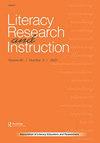Making Thinking Explicit: A Skill Continuum of Preservice Teacher Use of Strategic Think-Alouds in Literacy Instruction
IF 1.1
Q3 EDUCATION & EDUCATIONAL RESEARCH
引用次数: 0
Abstract
ABSTRACTTeachers understand the importance of think-alouds, yet research shows that think-alouds may be used ineffectively in practice. Often, this results from the difficulty of explicitly sharing the inner thought processes of competent readers and writers in transferable ways for students. To our knowledge, a tool for helping preservice teachers develop their competencies in rehearsing think-alouds for future instruction does not exist. Thus, the present study presents a Skill Continuum of Literacy Think-Aloud Practice demonstrated in preservice teachers’ (PSTs) articulation of metacognitive processes in modeled think-alouds during reading and writing instruction. Using qualitative content analysis, we explored how 55 PSTs applied metacognitive processes within online discussion forums for rehearsed think-alouds of reading and writing to create a skill continuum. This Skill Continuum of Literacy Think-Aloud Practice illustrates novice to more expert articulation of metacognitive processes within literacy think-alouds. Our findings reveal that integrating the metacognitive elements, rather than presenting them as discrete elements, reflects a more refined use of think-alouds in literacy instruction. Additionally, our findings highlight that integration of literacy strategies and skills shows a more refined level of implementation of modeling and explaining one’s thinking during reading and writing.KEYWORDS: Think-aloudsmetacognitionpreservice teacherscognitive apprenticeshipreadingwriting Disclosure statementNo potential conflict of interest was reported by the author(s).使思维显化:职前教师在识字教学中使用策略思维的技能连续体
摘要教师们理解大声思考的重要性,但研究表明,大声思考在实践中可能没有得到有效的运用。通常,这是由于学生很难以可转移的方式明确地分享有能力的读者和作家的内心思维过程。据我们所知,目前还不存在一种工具,可以帮助职前教师培养他们为将来的教学练习大声思考的能力。因此,本研究在职前教师(PSTs)在阅读和写作教学中模拟大声思考的元认知过程的表达中展示了一种技能连续体。使用定性内容分析,我们探讨了55名pst如何在在线讨论论坛中应用元认知过程,以排练阅读和写作的大声思考,以创造技能连续体。这种识字有声思维练习的技能连续体说明了识字有声思维中元认知过程的新手到更专业的衔接。我们的研究结果表明,整合元认知元素,而不是将它们作为离散的元素呈现,反映了在读写教学中更精细地使用“大声思考”。此外,我们的研究结果强调,识字策略和技能的整合显示了在阅读和写作过程中建模和解释一个人的思维的更精细的实施水平。关键词:大声思考元认知职前教师认知学徒写作披露声明作者未报告潜在的利益冲突。
本文章由计算机程序翻译,如有差异,请以英文原文为准。
求助全文
约1分钟内获得全文
求助全文
来源期刊

Literacy Research and Instruction
EDUCATION & EDUCATIONAL RESEARCH-
CiteScore
2.70
自引率
8.30%
发文量
18
期刊介绍:
Literacy Research and Instruction (formerly Reading Research and Instruction), the official journal of the College Reading Association, is an international refereed professional journal that publishes articles dealing with research and instruction in reading education and allied literacy fields. The journal is especially focused on instructional practices and applied or basic research of special interest to reading and literacy educators. Peer Review Policy: All articles in this journal have undergone rigorous peer review, based on initial editor screening and anonymous refereeing by reviewers.
 求助内容:
求助内容: 应助结果提醒方式:
应助结果提醒方式:


